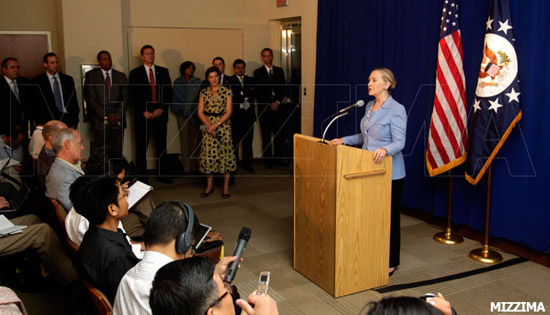U.S. Secretary of State Hillary Clinton on Monday signed a partial waiver on restrictions imposed on Burma under the Trafficking Victims Protection Act. The waiver will allow the U.S. to support assessment missions and limited technical assistance by international financial institutions (IFIs), such as the World Bank, the Asian Development Bank, and the International Monetary Fund, in Burma.

Clinton committed to supporting IFI assessments during her visit to Burma in December 2011 in response to encouraging democratic reforms.
The assessments by international financial institutions will provide critical means to gain a greater understanding of Burma’s economic situation, particularly its severe poverty alleviation needs and capacity gaps.
The Burmese government’s positive steps to reform include electoral measures to pave the way for Aung San Suu Kyi and the National League for Democracy to participate in upcoming parliamentary by-elections, release of political prisoners, broader civil liberties, and preliminary cease-fire talks with certain ethnic minority groups.
The waiver is also important in light of Burma’s need to create a banking and foreign exchange system in line with international standards and to reform its economic structure. Currently, it is working with the IMF which is assessing it’s economic structure.
Burma’s relationship with the U.S. has evolved rapidly in the past several months to the point where the U.S. is now considering reinstating a modest aid program and not oppose moves by the International Monetary Fund and other key bodies to offer assistance to Burma as it attempts to emerge from two decades of isolation.
Burma’s hope is that the U.S. and other countries will lift economic sanctions, which were put in place after the former military regime attacked and killed hundreds of peaceful demonstrators in 1988 and began a systematic imprisonment of pro-democracy activists.
During her December visit, Clinton said in a press conference that the U.S. is not ready to lift sanctions against Burma until it sees further concrete progress in reforms, including the release of all political prisoners, a resolution to the bloody fighting in ethnic areas, a more open democratic system that guarantees political parties the right to open offices and travel to all areas of the country, and an end to Burma’s “illicit” dealings with North Korea involving missiles and possible nuclear technology.
The Associated Press reported that during Clinton’s meeting with President Thein Sein he outlined his government's plans for reform in a 45-minute presentation in which he acknowledged that Burma lacked a recent tradition of democracy and openness. He asked for U.S. help in making the transition from military to full civilian rule.
At the time, Clinton was quoted as saying: “We’re not at the point yet where we can consider lifting sanctions. But any steps that the government takes will be carefully considered and will be matched.”
The Washington Post said the waiver, effective through September, applies to a number of restrictions under the 2000 Victims of Trafficking and Violence Protection Act.
The ambassador-at-large on human trafficking issues, Luis CdeBaca, who visited Burma in January, said on Monday that the waiver was rewarding Burma for its political reforms, including prisoner releases, the dialogue it has begun with Suu Kyi and cease-fires with ethnic minority armed groups.
But he said it also reflected the government’s encouraging steps in improving its treatment of human trafficking victims, particularly those repatriated from other countries, although the U.S. remains concerned over the authorities’ use of forced labor and child soldiers.
“We have seen several decent things happen on the human trafficking front,” CdeBaca said in an interview. “They [Burma] are not out of the woods by any means. But just as with democracy and electoral reforms, we also see the beginning of a positive trend.”



